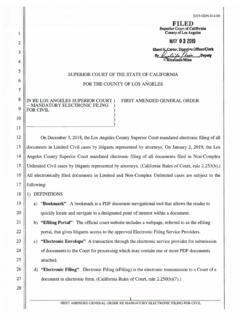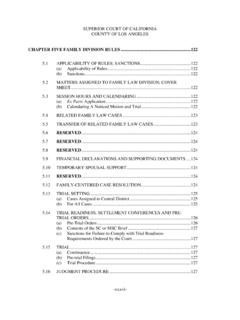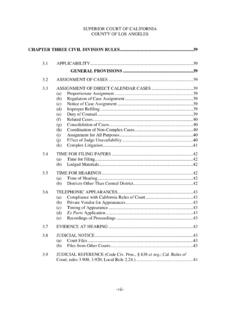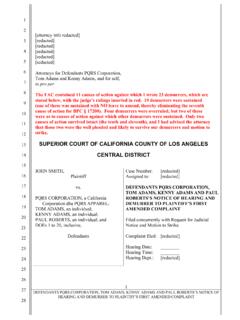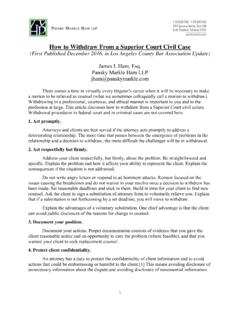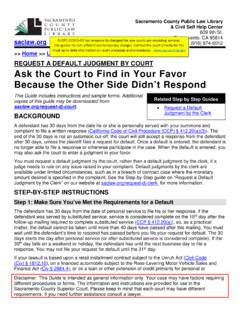Transcription of Mandate (aka “Mandamus
1 1 Writ of Mandate Outline1 Richard Rothschild Western Center on Law and Poverty 213-487-7211, ext. 24; I. What is a petition for writ of Mandate ? A. Mandate (aka Mandamus, ) is an "extraordinary" remedy provided by a court sitting in equity. In a Mandate proceeding, the petitioner asks the superior or appellate court to direct an inferior judicial or administrative body to do something. B. Confusing, because petition for writ of Mandate describes two completely different proceedings: 1.
2 Interlocutory proceedings in appellate court usually seeking order for trial court to change its pre-judgment ruling 2. Types of writs discussed here, are writs from the superior court to an administrative body such as a local housing authority, the Department of Housing and Community Development, a city council or board of supervisors acting in an administrative capacity, the Department of Health Services, the Department of Social Services, the Employment Development Department, a county Board of Education, a county Personnel Board or the like.
3 To the agency to take some action such as reversing an administrative order. For a full description of distinctions between the types of civil writ proceedings, consult California Civil Writ Practice, CEB Practice Guide, 4th Ed., April 2012. II. Difference between Administrative Mandate (CCP ) and Ordinary Mandate ( 1085). A. Ordinary Mandate is a traditional remedy by which a court compels an inferior tribunal to perform a legally required duty. The authorizing statute is CCP 1085 B. Administrative Mandate is a statutory remedy which enables a petitioner to challenge an administrative decision after an adjudicatory hearing in which the agency performs a fact finding function.
4 The authorizing statute is III. Deciding Which Type of Writ to File (or Both) Depends on the type of administrative proceeding and your goals 1 The following outline is based in part on one initially prepared by the late Sue Ochs. 2 A. What was the Underlying Proceeding you are challenging? Some proceedings are not considered adjudicatory, such as California Environmental Quality Act [CEQA] hearings, and you can only file under 1085.
5 Others, like fair hearings in welfare, including GA, or health or housing authority hearings, are adjudicatory, and a review of that decision is available under CCP B. Your goals. 1. If goal is solely to secure relief for an individual client, you should file a petition. 2. If broader goal is to change agency policy, then you need to file 1085 writ as well. You should also consider other remedies, and consult Choice of Relief in California State court Suits, available at Western Center s web site ( ) or from the author 3.
6 Can combine the two. Conlan v. Bonta, 102 745, 751-52 (2002). May want to do so even if only first goal is key to your client because government may offer to trade you individual relief for dropping policy aspect of suit. IV. Administrative Mandate - Nuts and Bolts (Note: is a comprehensive statute which covers all facets of an administrative writ proceeding. Do not ever file a petition for administrative Mandate without first reading carefully!). Included in your materials is a non-exhaustive list of the key provisions of the writ statutes.
7 A. Pre-filing 1. Administrative hearing. Administrative Mandate is only available to a petitioner who has had an agency hearing since the purpose of the remedy is to challenge the validity of an adjudicatory decision after hearing. For discussion of hearing procedure in welfare cases (applicable in part to other areas as well), see Ch. XIV of CalWORKs: A Comprehensive Guide to Welfare and Related Medi-Cal Issues for California Families, available from Western Center. But applies when hearing is required which is not the same as when hearing is held.
8 Therefore, administrative Mandate appropriate when agency should have held a hearing but did not. Pomona College v. superior court 45 1716, 1729 (1996) 2. Must exhaust administrative remedies. This means not only that you have to go through the hearing process, but also that generally you can t litigate an 3 issue that you could have, but did not, raise at the administrative hearing. While there are exceptions to this rule, listed below, do not count on these exceptions applying: i. the agency indulges in unreasonable delay ii.
9 The subject matter lies outside the administrative agency's jurisdiction iii. pursuit of an administrative remedy would result in irreparable harm iv. the agency is incapable of granting an adequate remedy v. resort to the administrative process would be futile because it is clear what the agency's decision would be. This exception is very limited. In re Joshua S. 41 261, 274 (2007) (futility exception doesn t excuse litigant from raising invalidity of regulation in administrative proceeding) vi.
10 Where important questions of constitutional law or public policy governing agency authority are tendered. Public Employment Relations Bd. v. superior court 13 1816, 1827 (1993). You need to timely request your administrative hearing, include all possible arguments, and ensure that you have created a complete administrative record. Otherwise, think carefully about use of your resources on a writ if remedies have not been exhausted. 3. Get everything you can in the administrative record. i.
